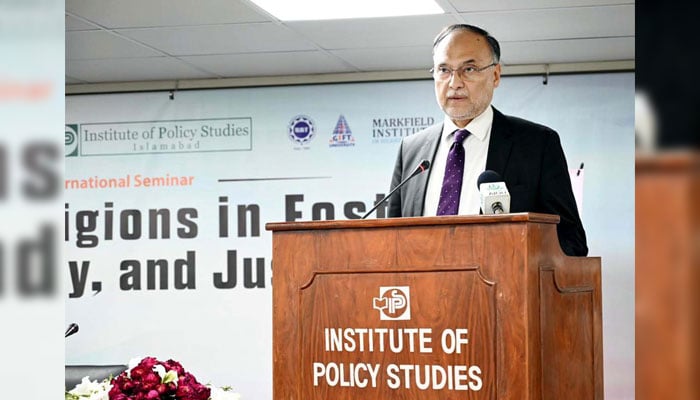Interconnection of peace, development underscored
Islamabad : There is an inseparable link between the role of religions and peace and development, as no society can flourish without the foundations of harmony, justice, and mutual respect, said planning and development minister Ahsan Iqbal on Wednesday.
"This connection has global significance, with particular relevance for Pakistan, as collective efforts are essential to bridge divides, foster inclusivity, and pave the way for sustainable development and equitable growth," Mr Ahsan told the inaugural session of an international seminar here. The day-long event, titled “The Role of Religions in Fostering Peace, Harmony, and Justice” and organised by the Institute of Policy Studies, brought together international and local speakers, scholars, religious leaders, policymakers, and civil society to discuss religion’s transformative role in tackling humanity’s key challenges.
It was a collaborative effort involving the Allama Iqbal Open University, National University of Modern Languages (Islamabad), University of Management & Technology (Lahore), Gift University (Gujranwala), The Islamic Foundation (UK), and the Markfield Institute of Higher Education (UK).
Minister Ahsan highlighted the enduring wisdom of faith traditions, emphasising their universal principles of human dignity, non-violence, and compassion. Drawing on teachings from Islam, Christianity, Judaism, Hinduism, Buddhism, and Sikhism, he noted that these shared values underpin harmonious and progressive societies.
The minister, however, voiced concern over rising intolerance and hate, which, he said, fuel extremism and hinder harmony and inclusivity. He underscored the importance of fostering a narrative rooted in tolerance. IPS chairman Khalid Rahman accentuated the decisive role of human behavior in shaping religion’s influence, saying religions are not inherently divisive; their impact depends on how they are practiced and interpreted.
He highlighted how religion is often misused to incite violence and exclusion, overshadowing its core values of compassion and justice. "Clashes often arise not because of inherent differences but due to mismanagement of diversity, personality clashes, and competing group interests," he said. Rahman stressed the need for inclusive strategies to resolve conflicts, bridge divides, and address socioeconomic disparities, emphasising that humanity’s strength lies in its diversity.
Dr Tamara Sonn of Georgetown University, Washington DC, highlighted religion’s paradoxical role in conflicts, noting its unparalleled potential to resolve disputes despite often being seen at their core. She warned against religious nationalism, calling it manipulative and destabilising, and urged societies to embrace universal values of justice, humanity, and equality.
Stressing the importance of values over identities, she said, “It is not the faith we are born into but the values we embody that define a person’s merit.” Dr Sonn advocated for interfaith collaboration through a “dialogue of action” to address shared challenges. Scholar and IPS founder and patron-in-chief Prof Khurshid Ahmad emphasised religion’s role in addressing spiritual needs, calling it a fundamental necessity throughout history.
He warned that modern civilisation’s departure from religion has led to injustice, oppression, and discord. “As humanity grapples with materialism, nationalism, and neo-colonialism, faith communities should foster harmony through moral appeal rather than coercion, offering ethical guidance to counter today’s challenges,” he said. Prof Khursheed highlighted Islam’s principles as fostering progress, justice, and harmony.
-
 Princess Beatrice, Eugenie Are ‘not Innocent’ In Epstein Drama
Princess Beatrice, Eugenie Are ‘not Innocent’ In Epstein Drama -
 Reese Witherspoon Goes 'boss' Mode On 'Legally Blonde' Prequel
Reese Witherspoon Goes 'boss' Mode On 'Legally Blonde' Prequel -
 Chris Hemsworth And Elsa Pataky Open Up About Raising Their Three Children In Australia
Chris Hemsworth And Elsa Pataky Open Up About Raising Their Three Children In Australia -
 Record Set Straight On King Charles’ Reason For Financially Supporting Andrew And Not Harry
Record Set Straight On King Charles’ Reason For Financially Supporting Andrew And Not Harry -
 Michael Douglas Breaks Silence On Jack Nicholson's Constant Teasing
Michael Douglas Breaks Silence On Jack Nicholson's Constant Teasing -
 How Prince Edward Was ‘bullied’ By Brother Andrew Mountbatten Windsor
How Prince Edward Was ‘bullied’ By Brother Andrew Mountbatten Windsor -
 'Kryptonite' Singer Brad Arnold Loses Battle With Cancer
'Kryptonite' Singer Brad Arnold Loses Battle With Cancer -
 Gabourey Sidibe Gets Candid About Balancing Motherhood And Career
Gabourey Sidibe Gets Candid About Balancing Motherhood And Career -
 Katherine Schwarzenegger Shares Sweet Detail From Early Romance Days With Chris Pratt
Katherine Schwarzenegger Shares Sweet Detail From Early Romance Days With Chris Pratt -
 Jennifer Hudson Gets Candid About Kelly Clarkson Calling It Day From Her Show
Jennifer Hudson Gets Candid About Kelly Clarkson Calling It Day From Her Show -
 Princess Diana, Sarah Ferguson Intense Rivalry Laid Bare
Princess Diana, Sarah Ferguson Intense Rivalry Laid Bare -
 Shamed Andrew Was With Jeffrey Epstein Night Of Virginia Giuffre Assault
Shamed Andrew Was With Jeffrey Epstein Night Of Virginia Giuffre Assault -
 Shamed Andrew’s Finances Predicted As King ‘will Not Leave Him Alone’
Shamed Andrew’s Finances Predicted As King ‘will Not Leave Him Alone’ -
 Expert Reveals Sarah Ferguson’s Tendencies After Reckless Behavior Over Eugenie ‘comes Home To Roost’
Expert Reveals Sarah Ferguson’s Tendencies After Reckless Behavior Over Eugenie ‘comes Home To Roost’ -
 Bad Bunny Faces Major Rumour About Personal Life Ahead Of Super Bowl Performance
Bad Bunny Faces Major Rumour About Personal Life Ahead Of Super Bowl Performance -
 Sarah Ferguson’s Links To Jeffrey Epstein Get More Entangled As Expert Talks Of A Testimony Call
Sarah Ferguson’s Links To Jeffrey Epstein Get More Entangled As Expert Talks Of A Testimony Call




